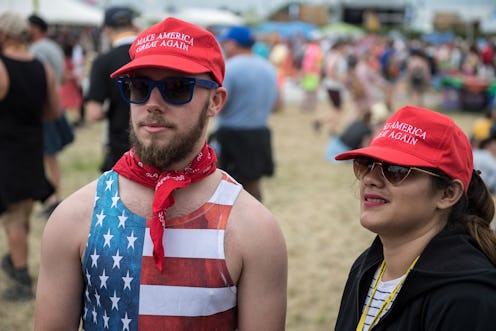News
A Judge Ruled That Bars Can Kick Out As Many Trump Bros As They Want

A New York Court ruled Wednesday that bars can kick out Trump supporters if they so desire, the New York Post reports. The decision came over a year after a Trump supporter sued the Happiest Hour bar on West 10th Street, claiming that the bar's staff booted him in January 2017 on account of his "Make America Great Again" hat.
The man in question, a Philadelphia accountant named Greg Piatek, argued that he was the victim of faith-based discrimination when staff at the bar, after spotting his red MAGA hat, said that they wouldn't serve him. Piatek claimed the staff told him that "anyone who supports Trump — or believes in what you believe — is not welcome here," and that when he and his friends were kicked out, he felt "extremely humiliated, degraded, victimized, embarrassed, and emotional distressed." He sued the bar for unspecified damages, CNN reports.
However, the Manhattan Supreme Court ruled Wednesday that supporting the president doesn't count as a "spiritual belief," and as such is not covered under state or federal anti-discrimination laws.
Meanwhile, the owner of the Happiest Hour said in a statement that Piatek wasn't kicked out due to his political beliefs, but because he was being unruly.
"What's gotten lost in this story is that the guest wasn't kicked out because he was wearing a Trump hat," Jon Neidich said in a statement. "He was asked to leave after being verbally abusive to our staff, which is something we don't tolerate regardless of who you are." Neidich also noted that Piatek left a 20 percent tip before leaving, suggesting that "he was sufficiently pleased with his service."
Nevertheless, Judge David Cohen ruled that even if the bar had 86ed Piatek solely because of his political beliefs, it would have been perfectly legal to do so, because there's no law against kicking someone out of a bar due to their political beliefs.
Piatek's attorney Paul Liggieri told the court that his client was in town visiting the 9/11 memorial, and that the pro-Trump hat was Piatek's attempt to pay "spiritual tribute to the victims of 9/11."
"The Make American Great Again hat was part of his spiritual belief,” Liggieri said. “Rather than remove his hat, instead he held true to his spiritual belief and was forced from the bar." This, Liggieri argued, meant that Piatek had been illegally discriminated against due to his religious beliefs.
“How many members are in this spiritual program that your client is engaged in?” Judge Cohen asked, according to the Post.
"Your honor, we don’t allege the amount of individuals,” Liggieri replied.
“So, it’s a creed of one?” Cohen asked.
“Yes, your honor,” Liggieri said.
But Elizabeth Conway, the Happiest Hour's attorney, argued that "supporting Trump is not a religion." Cohen ultimately agreed, in part because Piatek "does not state any faith-based principle to which the hat relates." The judge added that the incident amounted to nothing more than a "petty" slight, and tossed Piatek's lawsuit.
Liggieri said that he's reviewing the judge's opinion and will decide whether to appeal the case, according to CNN.
"Certainly, while we respect the judge's ruling, it will have implication for those that wish to express their creed, especially in New York and within New York City," Liggieri said, standing by the claim that supporting Trump is a religious belief. "You have to look to the legal definition and the reason why he wore that hat. He didn't wear it specifically to support Trump, the hat doesn't say Trump. He was paying tribute to 9/11 victims."
In his statement, Neidich said that although the staff didn't eject Piatek because of his Trump hat, the bar's staff does generally hold progressive beliefs.
"At the Happiest Hour we firmly support women’s’ rights, marriage equality, gun control, the environment, and regard for the truth," he said. "We don’t discriminate."
In a tweet, Republican National Committee Chair Ronna McDaniel called the court's decision "outrageous."